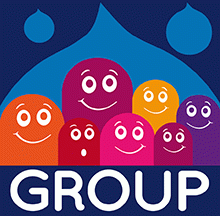 Support for Drupal 7 is ending on 5 January 2025—it’s time to migrate to Drupal 10! Learn about the many benefits of Drupal 10 and find migration tools in our resource center.
Support for Drupal 7 is ending on 5 January 2025—it’s time to migrate to Drupal 10! Learn about the many benefits of Drupal 10 and find migration tools in our resource center.The Group module allows you to create arbitrary collections of your content and users on your site and grant access control permissions on those collections
Out of the box, Drupal only allows a person to view, create or edit the different content types you create. However, you might want to be able to let them view or edit all content types, but only in a specific section of the site.
Group also allows you to create communities. Users of the site can become members of a Group. You can then decide what membership of a Group entitles them to, such as access to content only available to members of that Group. There can also be different levels of membership to a Group so, for example, you can have administrative members who can create content and basic members who can only view content within the Group.
Some example uses:
- Classes on a school website. With a teacher as the administrator, students as the members and the content as the learning material. Articles in the Group are created by the teacher and only visible to the students in the Group. Forums created in the Group are safe places to discuss the class as they are only accessible to the teacher and the students.
- Multiple tier subscription content access. If you have several different collections of paid for content then you can charge for access to each Group you create. Buying access would grant you membership to one Group and be able to access its content.
- Sub-editors on a magazine site. Collecting content together in a Group allows you to manage that content as a sub site and assign its own administrator. This is useful where you might need someone to produce lots of different types of content but only want them to be able to add it to a specific area of the website.
- Sub-communities within a membership organisation. The topics a membership organisation may cover can be very broad and individual members may only be interested in seeing content from a sub-selection of the areas it covers. The sub-community may have their own executive members who can add blog posts or approve new members to their sub-community.
- Conference management. An organisation which manages conferences might have a Group for each conference. Members of a conference Group might be able to submit talk suggestions. Paying to attend the conference might grant them a higher level of access to the Group allowing them to see more content. Members of a group can also be given the ability to have their own profile within the Group which might collect details about them for the conference such as their meal preference.
Index of Group versions
| Branch | Core support | Status |
|---|---|---|
| 8.x-1.x | Drupal 8 / 9 | Security fixes only |
| 2.x.x | Drupal 9 / 10 | Upgrade path from 8.x-1.x |
| 3.x.x | Drupal 9 / 10 | For fresh installs |
More info on the small difference between version 2 and 3 can be found in the release notes.
Note: functionality between version 2 and 3 are kept in sync. Version 3 does not have an upgrade path from version 2 or version 1 as it requires a migration.
Sponsored by Factorial GmbH
This project is sponsored by Factorial GmbH. Drop us a line if you are looking for interesting open source employment.
Project information
- Module categories: Administration Tools, Content Editing Experience, Access Control
15,227 sites report using this module
- Created by amitaibu on , updated
Stable releases for this project are covered by the security advisory policy.
Look for the shield icon below.
Releases
Resolves SA-CONTRIB-2023-054.
Development version: 3.2.x-dev updated 20 Dec 2023 at 15:10 UTC
Resolves SA-CONTRIB-2023-054.
Development version: 2.2.x-dev updated 20 Dec 2023 at 15:11 UTC
Development version: 8.x-1.x-dev updated 29 Aug 2023 at 13:49 UTC













